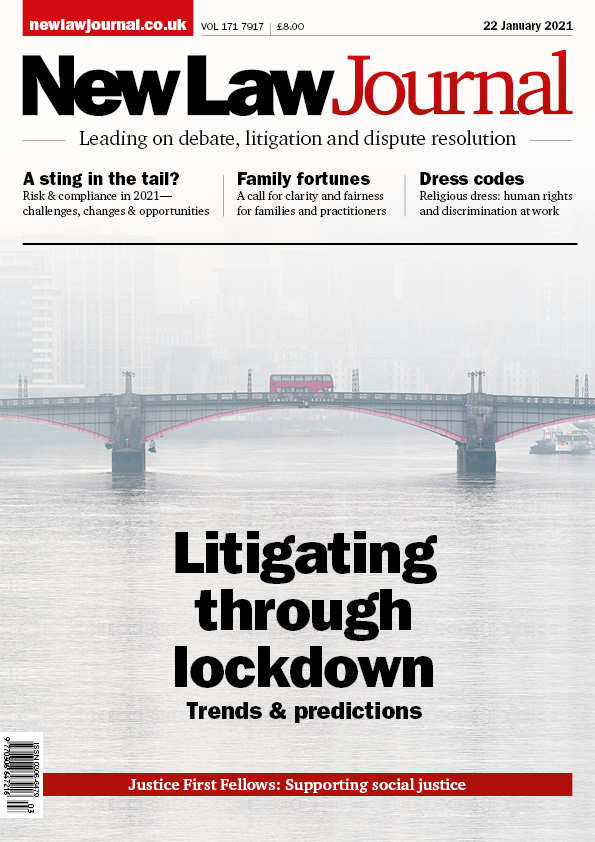THIS ISSUE

The Justice First Fellowship scheme now has more than 100 Fellows working in the social justice sector
There may be trouble ahead, not least with IT security, business uncertainty, the pandemic and Brexit
John Bowers QC examines some ground-breaking decisions on religious dress & calls for balance between competing perspectives
Fiona Bawdon explains why this ground‑breaking scheme is aimed at firms, as well as not-for-profit agencies
David Burrows calls for clarity and fairness for families and practitioners and highlights some priorities for the year ahead
Jon Robins questions the government’s decision to rule out a public inquiry into the circumstances surrounding the death of Pat Finucane
Lack of clarity and insufficient legal aid provision aside, what areas of family law need reform most?
Risk & compliance: Frank Maher provides expert analysis on the challenges ahead
Mental health, diversity and inclusion should be top priorities and more can be done to further efforts, according to a survey of litigation lawyers
In a special NLJ report, Grania Langdon-Down talks to Mrs Justice Cockerill, head of the Commercial Court, and litigators about the challenges of 2020 and what 2021 will bring in relation to work-flow, procedural reform, diversity and well-being. She also draws on responses from the latest London Solicitors Litigation Association (LSLA) and NLJ Litigation Trends Survey. Overall, most responders were positive that the litigation market would grow or, at least, remain unchanged. There was overwhelming support for virtual hearings and agile working. But there was also a strong message to the profession’s leaders that the legal community needs to do more to promote both diversity and inclusion and the importance of good mental health.
MOVERS & SHAKERS

Keystone Law—Milena Szuniewicz-Wenzel & Ian Hopkinson
International arbitration team strengthened by double partner hire

Coodes Solicitors—Pam Johns, Rachel Pearce & Bradley Kaine
Firm celebrates trio holding senior regional law society and junior lawyers division roles

Michelman Robinson—Sukhi Kaler
Partner joins commercial and business litigation team in London
NEWS
The government has pledged to ‘move fast’ to protect children from harm caused by artificial intelligence (AI) chatbots, and could impose limits on social media as early as the summer
All eyes will be on the Court of Appeal (or its YouTube livestream) next week as it sits to consider the controversial Mazur judgment
An NHS Foundation Trust breached a consultant’s contract by delegating an investigation into his knowledge of nurse Lucy Letby’s case
Draft guidance for schools on how to support gender-questioning pupils provides ‘more clarity’, but headteachers may still need legal advice, an education lawyer has said
Litigation funder Innsworth Capital, which funded behemoth opt-out action Merricks v Mastercard, can bring a judicial review, the High Court ruled last week







